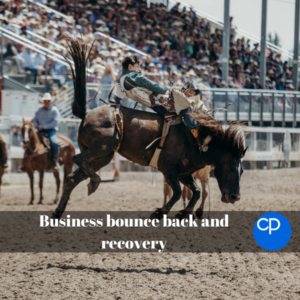 The current bounce back – lessons learnt from growing businesses through three previous recoveries.
The current bounce back – lessons learnt from growing businesses through three previous recoveries.
At the beginning of lockdown, I spoke to a former colleague, a successful marketing manager and business owner. As we speculated over what each of us could do to help our clients he reminded me that:
“It’s not like it’s our first rodeo!”
He was rightly reminding me that over the course of my career in CRM I have helped businesses grow out of three major recessions. The more we talked, and the more battle stories we shared, the more apparent it became that there were lessons to be learnt.
Early 90s recession – bounce back with the dotcom boom
In 1993 unemployment in the UK was 10.7%. At the time I was lucky enough to have a job working for an IT reseller with a specialisation in mainframe connectivity solutions. We had grown that business by focussing on a number of highly specialised and very technical solutions.
Identify and dominate a niche
At the time our focus was linking PC based networks to proprietary mainframe computers. There were several other companies with similar skills concentrating on the large base of IBM mainframes. We took the view that by concentrating on Honeywell Bull, a much smaller mainframe vendor, we could develop a deeper skillset more relevant to our clients’ needs.
Growing the business would rely on learning lessons from our existing clients and partners, and then applying them to other mainframe vendors such as ICL and Unisys. Key lessons such as:-
- Limit the number of partners you work with and build mutual dependence. As we became the largest provider of PC connectivity solutions to each of the mainframe vendors, they gained trust in us and our solutions.
- Use scale and commitment to grow your importance to partners so they support you.
- Focus on helping clients address current and future problems. Once we had established credibility by connecting PCs to their Mainframe and Mini computers, our clients were ready to work with us on future IT projects such as Office Automation and PC networking.
- Doing a great job gives you the credibility to ask for more.
- Invest to develop solutions that deliver measurable ROI to clients. As our clients increased their reliance on PC based systems, we developed tools to help them manage and automate business processes. Automation of these tasks could show rapid ROI, and improve consistency of reporting across the organisation.
- Develop and promote your own Intellectual Property IP as a differentiator.
Early 00s recession – bounce back to record growth and new industry
After the euphoric growth of the high tech sector and the dotcom bubble, the early noughties saw a crash in the value the NASDAQ. From a high of over 5000 at the beginning of 2000 to a low of 1,139 in 2002 – a slump of 76%. Small entrepreneurial high tech companies found their access to funding subject to increase scrutiny and scepticism as investment shrank.
At the time I was working with a number of my current colleagues selling Salesforce Automation solutions. My previous systems integration company had used a large percentage of its profits to fund a new start-up business in Europe to sell the leading Sales Force Automation (SFA) solution from the US. Early success had been built on large scale corporate rollouts to global FMCG (Fast Moving Consumer Goods) companies.
We identified the need for systems that would support smaller B2B organisations, which could be deployed at a fraction of the cost of the larger system. The needs of these organisations were poorly served by tools like Siebel which was designed for large scale global deployments. As a team, we were early adopters of Maximizer and continue to work with it to this day.
Growth of that business built on previous experience.
- We had a limited number of key supplier partners.
- We worked with clients to prove the ROI, by starting with a small user population and only growing as the ROI was achieved.
- We invested and developed our own add-on tools to address our clients’ needs
To grow the business we identified that there were a number of challenges that needed to be overcome. Overcoming those provided further insights which I believe will be key in the coming years.
- Develop the expertise and people you need in-house. Given our focus on new and innovative products, recruiting readymade experts was expensive and not always successful. By investing and developing our own experts we addressed a potential skills shortage and built team loyalty and cohesion.
- Invest in people and training as opposed to paying recruitment fees.
- Package services to make them easy to understand, and easier to purchase. When what you do is complicated it’s sometimes difficult for clients to work out if it is right for them and their needs. In particular technical and support services may not be purchased because the prospect doesn’t understand the need for them. By packaging services into an easy to understand “product” clients can quickly align features with their needs.
- Make it easy for clients to purchase added value services.
The 2008 recession – bounce back to record stock market highs in 2018
The sub-prime mortgage crisis and the credit crunch had the effect of freezing financial markets and triggered government intervention on a previously unseen scale. Despite predictions of a double-dip recession, the UK economy has recovered, and prior to the current crisis caused by the Coronavirus pandemic, was performing well.
By 2008 the core team at Collier Pickard had come together to build an Independent CRM Consultancy with the expertise that the market needed. Faced with the emergence of so many Software as a Service (SaaS) platforms, companies were struggling to identify which one was right for them. The team at Collier Pickard provided in-depth market knowledge, and product expertise, and access to an alumni network that encompasses all the major vendors.
In this bounce back, our growth was driven by our long-term relationships with key partners, and the depth of knowledge and experience within our team. Increasingly clients have sought our independent advice and consultancy services. They rely on our experience to address gaps in their knowledge.
The lessons we learnt in the last 10 years were some of the most challenging, yet have provided the most value.
- Getting everyone working towards a common goal is essential. With ever more flexible workforces and increased mobility, it is essential that your team works well together. If like us. you have invested to develop your teams’ skills, and they have gained expertise, it is essential to remove anything that causes them to question why they are working for you. Sometimes people will leave the team, but it is important to ensure that their reasons are positive, not negative.
- Team dynamics are more important than ever
- Build a framework, not a process manual. Our industry has changed over the last 30 years. Quality standards such as BS 5750 and ISO 9000 tried to document every business process in minute detail. Increasingly business processes need to change and change quickly. By creating an environment such that everyone in your team understands their role and companies goals, you can reduce the number of documented processes. Taking this to the next level, empowered employees will assess business requirements against a framework to identify the “best next action.”
- Encourage autonomy within your team.
- Value comes from expertise, not commoditisation. The value we provide to our clients is not our ability to deliver commodity software. It comes from our knowledge and experience of addressing business needs. While that may require some software or some server hardware, that is not what our clients value. In the current CRM market, there is a significant number of vendors who will claim their software addresses your business needs and requires no knowledge beyond that found on YouTube. Our view is that to grow your business doing what thousands of other YouTube viewers do with the software will not differentiate you or your offer. What’s more, the need to change rapidly means that our shortcuts, hacks and expertise will help you to evolve at the right pace to win new business.
- Buy expertise to further reduce the price of commodities
So there you have it. Thoughts from someone definitely not “at their first rodeo”, but someone still learning. As another colleague often says.
Experience is the thing you acquire, shortly after you first needed it!




